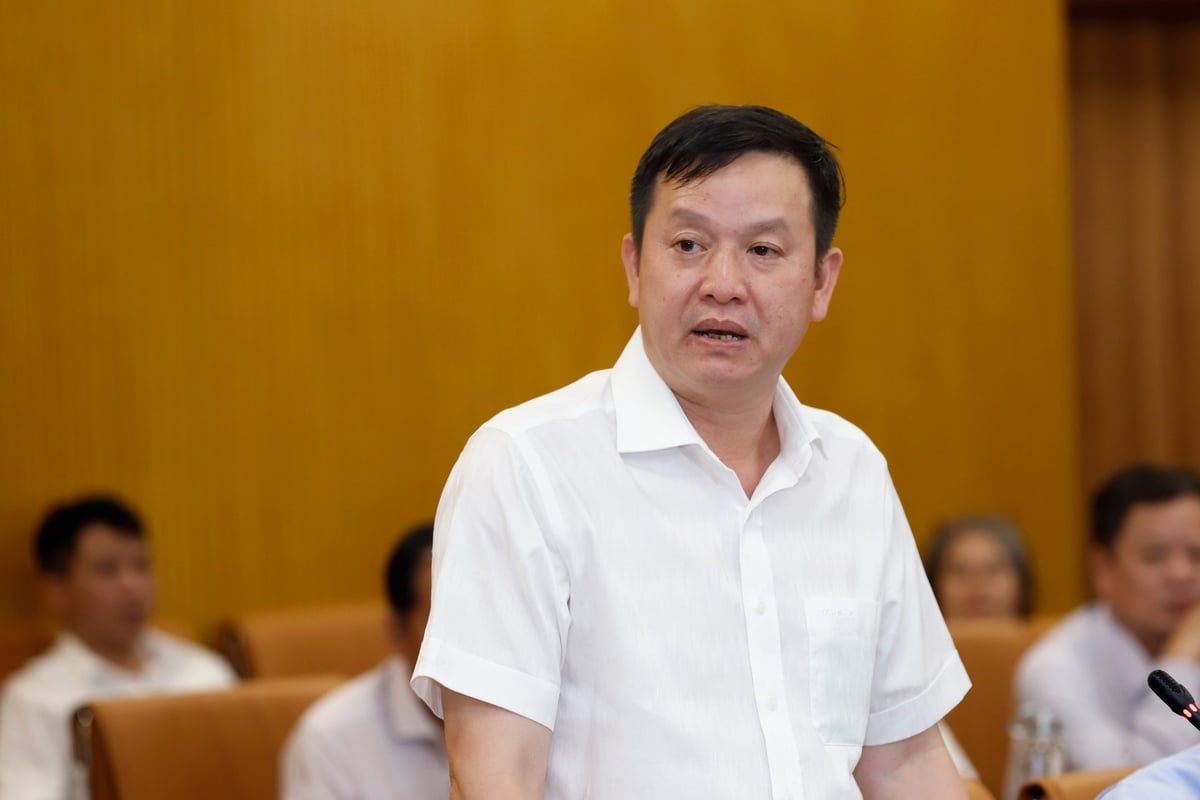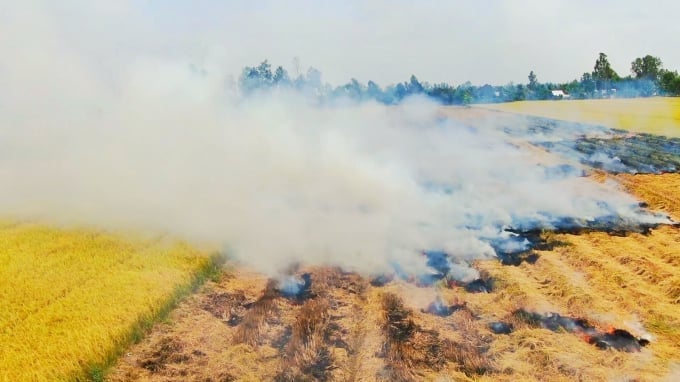December 7, 2025 | 13:17 GMT +7
December 7, 2025 | 13:17 GMT +7
Hotline: 0913.378.918
December 7, 2025 | 13:17 GMT +7
Hotline: 0913.378.918
At the consultation workshop on the draft National Action Plan for Air Quality Management for the 2025 - 2030 period, Mr. Huynh Tan Dat, General Director of the Crop Production and Plant Protection Department, offered several noteworthy comments. He particularly emphasized the importance of identifying pollution sources from agricultural and crop production activities and called for a clear roadmap for effective control.

Mr. Huynh Tan Dat, General Director of the Crop Production and Plant Protection Department delivered the speech. Photo: Khuong Trung.
Speaking at the conference, Mr. Huynh Tan Dat noted that the current draft action plan already has a sound theoretical foundation and a clear structure. However, he suggested that to further improve the plan, it should delve deeper into identifying the causes of air pollution, particularly those stemming from agricultural production and waste treatment activities.
According to Mr. Dat, one major source of emissions is the inefficient management of by-products and waste in agricultural production. Currently, the total volume of agricultural by-products is estimated at around 150 million tons per year, with crop production alone accounting for approximately 94 million tons. These by-products mainly come from major food crops, industrial crops, and vegetables.
Among them, rice straw represents about 47% of crop production residues. Around 30% of these by-products have been reused for purposes such as organic fertilizer, aquaculture, biomass energy production, or industrial raw materials. However, the remaining 70% is still discarded, burned in the fields, or released into the environment, significantly affecting air quality.
In addition, the collection and treatment of used pesticide packaging is also a persistent challenge. Every year, the agricultural sector generates about 944 tons of used pesticide containers, yet the collection rate reaches only around 62.3%. The rest is either burned or directly discharged into the environment, posing a serious pollution risk.
To address this situation, the sector has proactively incorporated solutions into its action strategy. One of the key goals is to maximize the reuse of agricultural by-products for value-added purposes such as producing building materials, renewable energy, and bio-fertilizers. At the same time, it encourages the application of advanced technologies, such as on-site biological processing and enzyme production, to accelerate the decomposition of by-products.
Expanding on this group of solutions, Minister of Agriculture and Environment Do Duc Duy emphasized that in agriculture, if by-products are effectively managed, such as being reused for energy production or integrated into circular processes. It is entirely possible to reduce emissions almost completely without disrupting production activities.
“This is a high-potential area and deserves prioritized investment,” Minister Do Duc Duy affirmed.
Continuing the discussion, Mr. Huynh Tan Dat, General Director of the Crop Production and Plant Protection Department, stated that a range of supportive policies has already been developed. These include support for farmers in purchasing collection machinery, incentives for enterprises to research and develop crop residue treatment technologies, and especially the promotion of robust monitoring systems and clear technical procedures for waste treatment.
Regarding the management of used pesticide packaging, Mr. Dat proposed establishing a financial mechanism through an environmental protection fund. Under this model, agricultural input manufacturers would contribute to support the collection and proper disposal of packaging in accordance with national standards.
In addition, he stressed the need to develop technical standards for agricultural packaging, giving priority to recyclable or biodegradable materials. The sector also recommends building an extensive collection network to make it easier for people to access and participate in the system.
Currently, Circular 05, which regulates the collection of used pesticide packaging, has been issued. However, since the merger of certain functional units, implementation has lacked clarity, particularly in defining the roles and responsibilities of the involved parties. Therefore, the national plan must emphasize the duties of relevant agencies in organizing the collection and treatment of agricultural waste.

The practice of open-field burning remains widespread today. Photo: Kim Anh.
In addition, the sector has proposed establishing a coordination mechanism for inspection and monitoring between the Ministry of Agriculture and Environment, the Ministry of Industry and Trade, and local authorities. This aims to enhance the effectiveness of enforcing regulations on agricultural waste and pesticide packaging violations, particularly in rural areas and informal markets.
From a policy perspective, the sector recommends adding several key elements to the objectives and solution groups of the national action plan, specifically: Integrating agricultural waste management and monitoring into the plan, with a clear goal of eliminating the open-field burning of straw and crop residues; establishing a control and monitoring system for emissions from agricultural production activities and post-harvest waste; developing a comprehensive database and clear inspection procedures to enable synchronized implementation in the near future.
General Director Huynh Tan Dat affirmed that the sector is committed to working closely with relevant ministries, sectors, and localities in implementing the national action plan to ensure the achievement of sustainable development goals and improved air quality.
Translated by Kieu Chi

(VAN) As of 2025, the ASEAN region has a total of 69 ASEAN Heritage Parks recognized across its 10 member states. Among them, Viet Nam contributes 15 ASEAN Heritage Parks.

(VAN) Yok Don National Park has high biodiversity with numerous endemic plant and animal species, and it is also the only dipterocarp forest ecosystem conservation area in Viet Nam.

(VAN) Viet Nam and Brunei signed two important MOUs on fisheries and IUU, expanding cooperation in agriculture, the environment, and Halal exports, aiming to substantively implement joint projects.

(VAN) The Viet Nam Coconut Association worked with the International Finance Corporation (IFC) and businesses to promote the supply chain, enhance competitiveness, and develop the coconut industry sustainably.
![Hue aims for Net Zero: [2] Pioneering low-emission tourism](https://t.ex-cdn.com/nongnghiepmoitruong.vn/608w/files/huytd/2025/12/04/0633-dulichzero-4-095634_236-161125.jpg)
(VAN) The ancient capital of Hue has developed Net Zero tourism products and models, aiming to reduce carbon emissions and pioneer the establishment of Viet Nam's green tourism destination.

(VAN) C.P. Viet Nam has announced the successful completion of its goal to plant 1.5 million trees during the 2021-2025 period, a key milestone within company's long-term ESG strategy and its roadmap for emission reduction.

(VAN) This is an initiative of MAE aimed at creating a unified coordination mechanism to implement agricultural cooperation programs with developing countries.